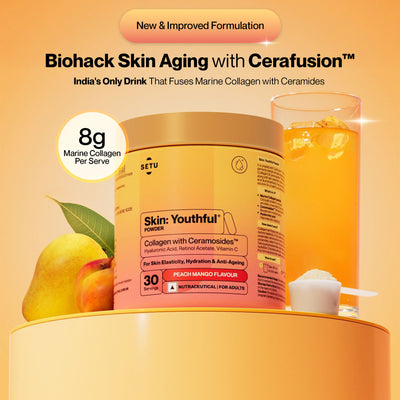Egg Yolks & Cholesterol: What’s The Connection?
28 Nov 2019
Eggs have been accused of raising cholesterol levels. However, the reality may be different. Here we tell you the actual connection between eggs and cholesterol.
If you are someone suffering from high cholesterol and you miss having those succulent sunny-side-up eggs in your breakfast plate, we feel you! For the longest time, this humble breakfast item has been associated with contributing to high cholesterol, and probably even making it worse. But are eggs really the villain we think they are? Let’s dig a little deeper into the matter and find out.
Safe for Cholesterol

The yellow part of eggs, the yolk, contains a high amount of cholesterol. In fact, a single medium-sized egg contains 186 mg of cholesterol, which is almost the recommended upper limit for most people (200 mg). Hence, it was advised to skip the yolk and stick to the white section when having it. However, recent research shows that the cholesterol in egg yolks does not cause a significant increase in cholesterol in most individuals. Dietary cholesterol is broken down by our digestive systems, which is why egg yolks have a minimal impact on blood cholesterol levels. Most healthy people can eat up to seven eggs a week with no increase in their risk of heart disease.
If eggs are innocent, then what exactly is causing the harm? The culprit is the method of cooking and foods that complement eggs. A classic breakfast with eggs would include white bread, canned juice, cornflakes, salted nuts and more, most of these items have high levels of sodium, preservatives, and saturated fat. The last one is the worst for cholesterol as it raises LDL (bad) cholesterol levels. Additionally, the oils used to cook eggs containtrans fatty acids that not only raise LDL but also lower HDL (good) cholesterol levels. Control the overall unhealthy habits instead of eggs, as these white foods are, in reality, great for maintaining your health and immunity.
Eggs and Diabetes
While eggs are now proven to be safe to consume, the story might be slightly different for those with diabetes. Some studies show that eggs might have an adverse effect on cholesterol for patients who also have diabetes, as high blood sugar can increase the risk of heart diseases. On the other hand, some studies show that eggs help improve blood sugar issues. Since there is no concrete conclusion on this, experts advise diabetics to limit egg consumption to three times a week.
Eggs Can Be Good For The Heart

Contrary to what was believed, eggs are good for heart health as they contain several vitamins that lower blood pressure. They are a good source of three types of vitamin B – B2, B12, and folate, which are known to lower cholesterol levels, improve arterial elasticity, and reduce the risk of heart attacks.
Other Health Benefits of Egg Yolk
Despite the egg yolk cholesterol association that has prevailed for decades, the yolks are actually a kind of superfood. They are way more nutritionally dense than most other foods and actually contain most of the nutrition to be had in eggs. So, eating egg whites and discarding the yolk actually makes no sense at all. Here are some health benefits that will help you see beyond the egg yolk and cholesterol connection.
A Dose Of Vitamins And Minerals
You can forget about those multivitamins because egg yolks contain a good amount of vitamins and minerals. In fact, most of the nutritional value in eggs is to be found in the yolk, rather than the egg white. If you can put aside your egg yolk cholesterol obsession, you’ll find that the yolks contain vitamins A, D, E, as well as B vitamins, including B12, B6, thiamin, and riboflavin. In addition, the yolk is also a good source of nutrients like choline, calcium, iron, phosphorus, zinc, and selenium. Of all of these nutrients, the only one that is more concentrated in egg whites is riboflavin. The vitamin D content of egg yolks is also regarded as particularly beneficial for diabetics, who are unfortunately most likely to skip this food because of the egg yolk cholesterol association – a concern for diabetics who are at higher risk of heart disease.
Healthy Fats
In addition to the dose of vitamins and minerals that we’ve already touched upon, eggs are perhaps the most accessible source of healthy fats. The yolk contains phospholipids, which are amphiphilic lipids or a type of fat that plays an important role in cellular growth. Although found in a variety of plant-based and meat-based foods, eggs are regarded as the best source of phospholipids. Phospholipids exhibit antioxidative activities, providing a wide range of health benefits.
One of the most notable benefits of egg phospholipids is its cardioprotective effect, as it has a positive influence on both cholesterol levels and inflammation in the body. This makes avoidance of eggs because of concerns about egg yolk cholesterol all the more ironic. Additionally, some studies have shown that phospholipids improve metabolic markers, such as reducing blood pressure and improving vascular function, all of which are good for the heart.
In addition to the heart health benefits, there’s another good reason to ignore egg yolk cholesterol connections. Phospholipids from the yolk are also good for brain function, strengthening cognitive function and memory. Some research suggests that they may offer some degree of protection against degenerative brain disorders like Alzheimer’s, although more evidence is needed for this to be conclusive.
Antioxidant Benefits
Once again, you’re reminded to discard that egg yellow cholesterol association because the yellow color of yolks is actually attributed to antioxidants or rather compounds with strong antioxidant activity. To be specific, the yolk contains carotenoids, which give them their color. You may have heard of the many benefits of these antioxidants, which are also found in plant-based foods, but it should be pointed out that their bioavailability is much higher in eggs. The yolk is also a source of another antioxidant called phosvitin, which improves iron absorption in the body, without the risk of iron oxidation, which can have inflammatory effects on the body.
So, the next time someone asks you ‘does egg yolk have cholesterol?’ or ‘is egg yolk high in cholesterol’, you’ll know exactly what to say! You can go ahead and enjoy a piece of sunshine every morning for breakfast with different types of eggs. However, you must ensure that you eat in moderation, cook it in a healthy manner, and with healthy foods.
Skin: Renew - Glutathione - Orange Flavour
- ₹1,994
- ₹1,994
-
₹2,600 - ( 23% OFF)
Categories
- Choosing a selection results in a full page refresh.
- Press the space key then arrow keys to make a selection.
this is the sidecart










